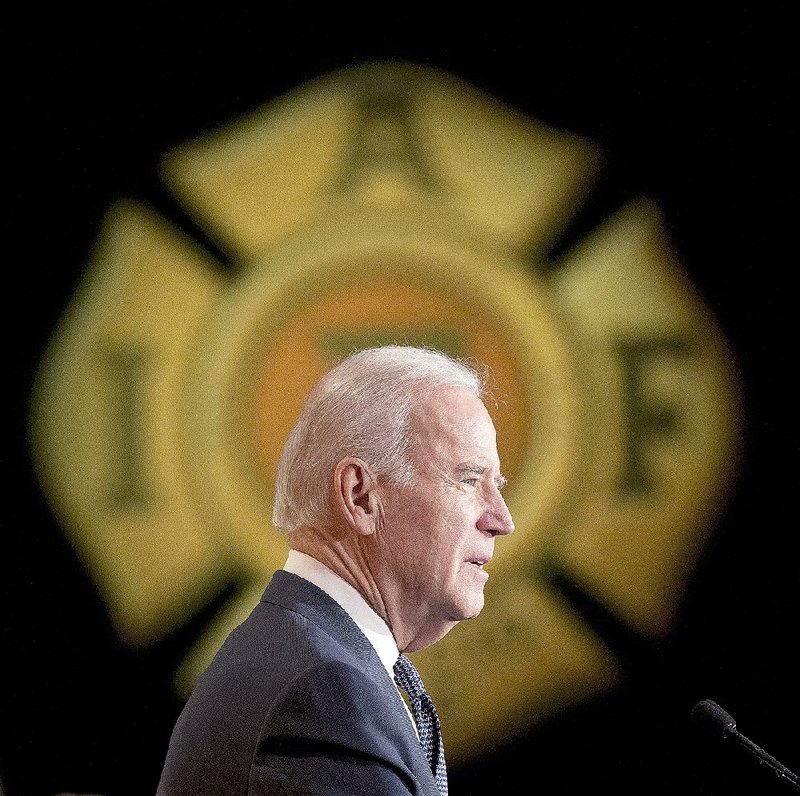WASHINGTON -- Vice President Joe Biden joined in the denunciation of a letter that 47 Republican senators sent to Iranian leaders, prompting Sen. Tom Cotton of Arkansas to lash back Tuesday.
The letter, drafted by Cotton, was sent to Iranian leaders Monday. It said the only acceptable deal with Iran over the country's disputed nuclear program would require the dismantling of the program. It also warned the Iranians that any agreement with President Barack Obama might last only to the end of his term.
The White House immediately denounced the letter, and late Monday Vice President Joe Biden issued a statement calling the Republicans' action an unprecedented intrusion into foreign affairs that would hobble the ability of future presidents in negotiating with other nations.
"I cannot recall another instance in which senators wrote directly to advise another country -- much less a longtime foreign adversary -- that the president does not have the constitutional authority to reach a meaningful understanding with them," Biden said. "The decision to undercut our president and circumvent our constitutional system offends me as a matter of principle."
Biden is a Senate veteran of more than three decades and a former chairman of the Foreign Relations Committee.
"Honorable people can disagree over policy," Biden said in the statement. "But this is no way to make America safer or stronger."
Cotton shot back Tuesday.
"Joe Biden -- as Barack Obama's own secretary of defense has said -- has been wrong about nearly every major foreign policy and national security decision in the last 40 years," he said on MSNBC's Morning Joe program.
In his letter, Cotton informed Iranian leaders that "Congress plays a significant role" in ratifying agreements and that anything not approved by Congress is "nothing more than an executive agreement between President Barack Obama and Ayatollah Khamenei," Iran's supreme leader.
He warned that a nuclear deal probably wouldn't survive beyond Obama's presidency.
"We're making sure that Iran's leaders understand if Congress doesn't approve a deal, Congress won't accept a deal," Cotton said Tuesday. "Because we're committing to stopping Iran from getting a weapon."
The U.S. and five other nations are working to craft an agreement that would prevent Iran from being able to develop nuclear weapons, though Tehran insists its nuclear work is peaceful. Republicans worry that Iran is not negotiating in good faith and that a deal would be insufficient and unenforceable, allowing Iran to eventually become a nuclear-armed state.
Secretary of State John Kerry is set to head for another round of talks with Iran's foreign minister and the five other world powers Sunday.
The administration has said the agreement being discussed would cut back Iran's ability to enrich uranium and ensure that Iran is a minimum of one year away from a breakout -- the time needed to assemble the fissile material for a weapon -- for at least 10 years. Obama has said any deal also would require Iran to submit to a strict inspections schedule.
For Cotton that's not enough. He said Iran should have no right to enrich uranium and that the U.S. must keep a credible military threat on the table to enforce the demands.
"Iran's leaders need to understand that any deal that gives them a path to a bomb today, tomorrow, 10 years, 15 years from now, will not be accepted by the United States Congress," he said.
Arkansas' state political parties weighed in on the matter Tuesday.
Doyle Webb, chairman of Arkansas' Republican Party, issued a statement calling for an apology from U.S. Rep. Jared Polis, D-Colo., who referred to Cotton as "Tehran Tom" while criticizing the letter on Twitter.
"I am very disappointed by the recent comments made by Congressman Polis. Disagreements are common in Washington, and differences in opinion can lead to workable solutions, but making public comments attacking a United States Army Veteran is appalling," Webb said.
Vince Insalaco, chairman of Arkansas' Democratic Party, criticized Cotton's involvement Tuesday.
"Cotton served one two-year term in the House and spent most of that time running for the Senate. Yet, Cotton's blind ambition has him acting as if he is running for president. He is willing to endanger our country's international negotiations in the process," Insalaco said in a statement.
In addition to Cotton, the letter's signatories include a handful of Republican White House prospects, Florida Sen. Marco Rubio, Texas Sen. Ted Cruz and Kentucky Sen. Rand Paul, among them.
Former Florida Gov. Jeb Bush and Wisconsin Gov. Scott Walker issued statements Tuesday suggesting their Senate colleagues were justified in sending the letter.
"The senators are reacting to reports of a bad deal that will likely enable Iran to become a nuclear state over time," Bush said.
Former Secretary of State Hillary Rodham Clinton, a leading contender for the Democratic nomination, also weighed in Tuesday, saying Republicans were either trying to help the Iranians or hurt Obama.
"Either answer does discredit to the letter's signatories," she said.
Iranian Foreign Minister Javad Zarif dismissed the letter Monday as a propaganda ploy. In an address Tuesday to Iran's Assembly of Experts, the country's top religious body, he said that in the letter, "we're in fact being told that the U.S. is unreliable," according to the state-run news agency.
In remarks on the Senate floor Tuesday, Sen. Dick Durbin, D-Ill., called the letter reckless, much as it would have been for U.S. lawmakers to "reach out to the Vietnamese" a generation ago. He said he hoped it would not cause the negotiations to fail.
Senate Foreign Relations Chairman Bob Corker, one of seven Republicans who did not sign the letter, also lamented the discord over the issue.
"There are a lot of frustrations no doubt around the Iran issue, and I hope we can move beyond some of the drama to focus, if there's a deal, on its content," Corker said. "But also to make sure that Congress has an appropriate role."
Corker's committee is set to vote later this month on legislation that would require congressional approval for any nuclear deal with Iran. The White House has vowed to reject the legislation, and Corker is trying to round up enough Democratic votes to override a veto.
"I see my role as getting to an outcome, so I didn't view the letter as helping to achieve an outcome that I would like to see, which is us having an opportunity to appropriately weigh in on an arrangement that is so important to our nation's future and to the stability of the Middle East," Corker said Tuesday.
Some Democrats in the Senate have joined Corker in that approach.
Republicans hold 54 seats in the Senate and 10 Democrats have said they'll support the measure, though only after the end-of-the-month deadline for the current round of negotiations with Iran. That's three votes short of the number needed to override a veto.
Tim Kaine, D-Va., who co-sponsored the legislation with Corker and others, said he remains "strongly supportive" of the bill even as he criticized the 47 Republicans for injecting partisanship into the debate and undercutting the negotiations.
"This had a lot of momentum in terms of getting bipartisan sponsors," Kaine said Tuesday. He called the letter a stunt that had made some Democrats "more wary."
Maine Republican Sen. Susan Collins, who also declined to join in the letter, said "It's more appropriate for members of the Senate to be giving our advice to the president, to Secretary Kerry and to the negotiators."
But Senate Majority Leader Mitch McConnell defended the letter.
"If there is not a deal, we've had some of our Democratic friends say the choice is between this deal and war," he said Tuesday.
"No, the choice is between this deal and greater sanctions, because we've finally discovered one thing that works."
Information for this article was contributed by Toluse Olorunnipa, Ladane Nasseri, Kathleen Hunter and Peter Cook of Bloomberg News; by Deb Riechmann, Andrew Taylor, Alan Fram, Steve Peoples, Chuck Babington, Laurie Kellman and Donna Cassata of The Associated Press; by Julie Hirschfeld Davis of The New York Times; by William Douglas and staff members of Tribune News Service; and by Sarah D. Wire of the Arkansas Democrat-Gazette.
A Section on 03/11/2015

